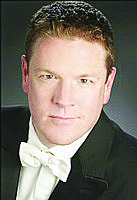- November 5, 2024
-
-
Loading

Loading

Robert Burns will, I trust, forgive me if I paraphrase him and remind those of us in the 21st century that the best-laid plans of mice and men often go awry. And, I trust many of you will forgive me when I lay this quote directly at the feet of the highly praised and ne’re maligned Westminster Choir.
Students attending New Jersey’s Westminster Choir College often find themselves in the enviable position of singing with many of the world’s greatest orchestras and conductors; it’s a marvelous training ground for future pedagogues and choir members.
Last week, under the direction of Joe Miller, about 40 members of this elite ensemble stopped off at First United Methodist Church, in Sarasota, as part of a rigorous Florida tour for a program called “The Cloud-Capp’d Towers.” The program featured works that ran the musical gauntlet from Bach, Brahms and Mahler, to several contemporary composers.
The singing was near perfection. But the spirit and vitality were often missing. Even though the repertoire ranged over 300 years, many of the works — including the juxtaposition of Ola Gjeil’s “The Spheres” from “Sunrise Mass” and a portion of Bach’s motet, “Lobet den herrn, alle Heiden,” — sounded the same, with a straight, harsh tone that sapped the vibrancy and left only a chaste, stainless sound.
This is not to say the students were untalented or the concert wasn’t good. It was beautifully sung but too often lacked color and energy. “To a Locomotive in Winter,” a persistently driving and probably amusing work by Jaakko Mantyjarvi, was a nice attempt to invigorate things, but with the house lights almost completely out, it was impossible to follow the all-important text.
Life came into the group, almost against its and its conductor’s will, in the stunning performance of Vaughan Williams’ setting of Shakespeare’s “The Cloud-Capp’d Towers,” a richly haunting work, as well as in its exquisitely languorous but disappointingly predisposed rendition of Shaw’s arrangement of “Set Down Servant” and almost all of Kinley Lange’s “Esto Les Digo,” which took on an other-worldly hue.